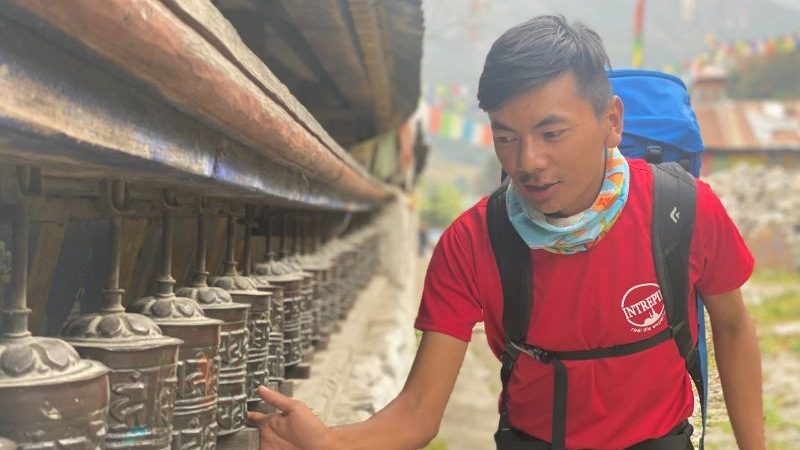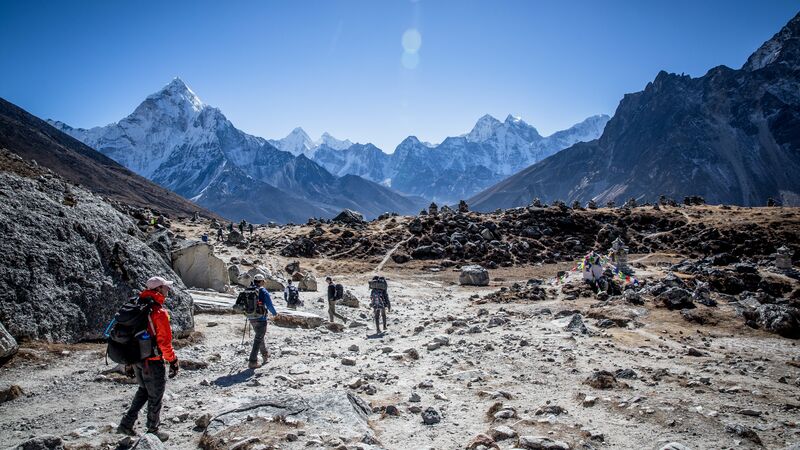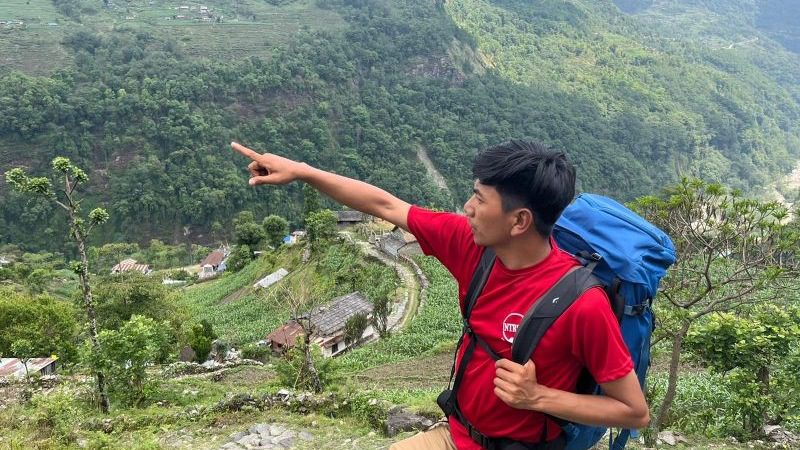
Tackle Everest Base Camp, or the Annapurna mountain range, and you might find yourself following - quite literally - in the footsteps of a Phurpa Sherpa. It's a busy time of year for the valiant 27-year-old chief, but on a rare day off in Kathmandu, take time to chat about the mountains, tourism and why he'll never get tired of guiding.
It's been a really tough season, Vorba admitted, at the beginning of our conversation. He's nearing the end of his four-day break and will meet his next group tomorrow. From Kathmandu, they will travel to Lukla - a gateway Everst top - Before starting the twelve-day return trip to Base Camp. “It's so busy, with back-to-back flights,” he says, “but I'm so glad I'm guiding again. It's been a long time.”

Vorba began working with Intrepid a decade ago as a pregnant 17-year-old. He was promoted to assistant guide in 2016 and it took another two years of training - a lot of it in the mountains - to become a full leader. He explains that the team will often promote from porter to assistant guide and assistant guide to captain, "because we need people with good English as well as experience in the mountains. It's hard to find someone with both."
Phurba has worked hard to get where he is, but like many others, his career was put on hold when Nepal's tourism industry came to a halt during the pandemic. “There were no tourists, so I went back to my village of Lukla to help my family farm,” he says.
There may not have been any tourists to guide him, but Phurba still managed to keep his mountain skills sharp, logging five to ten kilometer runs most days, despite Lukla's lofty elevation (2,860 metres). This wasn't just a light jog. Phurba has run the Everest Marathon — from Base Camp to Namche Bazaar — three times now, and finished fifth in the 2016 and 2018 editions of the legendary race. At this point, the Himalayan tahr (a type of mountain goat) is more than human, which comes in handy when you're being paid to lead treks to the world's highest peaks.

"As a Sherpa, I was born and raised in the mountains," he says. “I grew up seeing a lot of foreigners and hikers. There are so many mountains, waterfalls, and forests, and I feel really lucky and proud to share these moments and experiences with travelers. I want to give them a once-in-a-lifetime experience.”
Now that travelers are back in the Himalayas, once-in-a-lifetime experiences are exactly what Phurba facilitates. He remembers a 77-year-old woman - "Miss Fiona" - who recently traveled with him to Base Camp. “I felt very happy to see her complete the journey without any problems. No headaches and no problems at all. It was a great achievement for her and me too. I loved playing a part in making her dream come true.”

It's not just travelers who benefit from being in the mountains; For Phurba, the majestic peaks on the surface of the world inspire his growth. "I feel powerful when I'm in the Himalayas," he says. “As I expose myself, I face my fear and accept challenges while ensuring everyone is safe. I have learned a lot of things, and my communication and language skills are improving and growing on each trip. I learn more on each trip because of the different languages, backgrounds and cultures.”
It is this constant learning, and the ever-changing nature of the Himalayas, that motivates Phurba to continue exploring the mountains. "I never get bored with nature," he says. “Even on the same trip, the weather and landscape will change and there will be new people every time. I'm always learning and I'm never bored.”

However, he is philosophical about his future. Given his age, there should be plenty of mountain trekking left, but life, he points out, often has other plans. “When I was young, I told my teacher that I wanted to be a doctor, or a pilot, or in the army. But life takes a different path. I am very happy now, but you never know what will happen.”
It is fitting, then, that Vorba sees the destination—in this case, Base Camp—as secondary to the trek. On the first day of the trek, I explained that the trek is not just about getting to the destination. It is more about creating good moments and memories along the way. In the evening, we congratulate each other and spend some time learning about the culture, religion and Nepal. We want to make sure that visitors know Nepal over mountains. And Base Camp, it's not about health or youth; In the end, it's a positive mindset that makes you successful."
Did a Phurpa Sherpa inspire you to climb a mountain? Take the first step by checking out Everest base camp And the Annapurna trek.
Source link
0 Comments